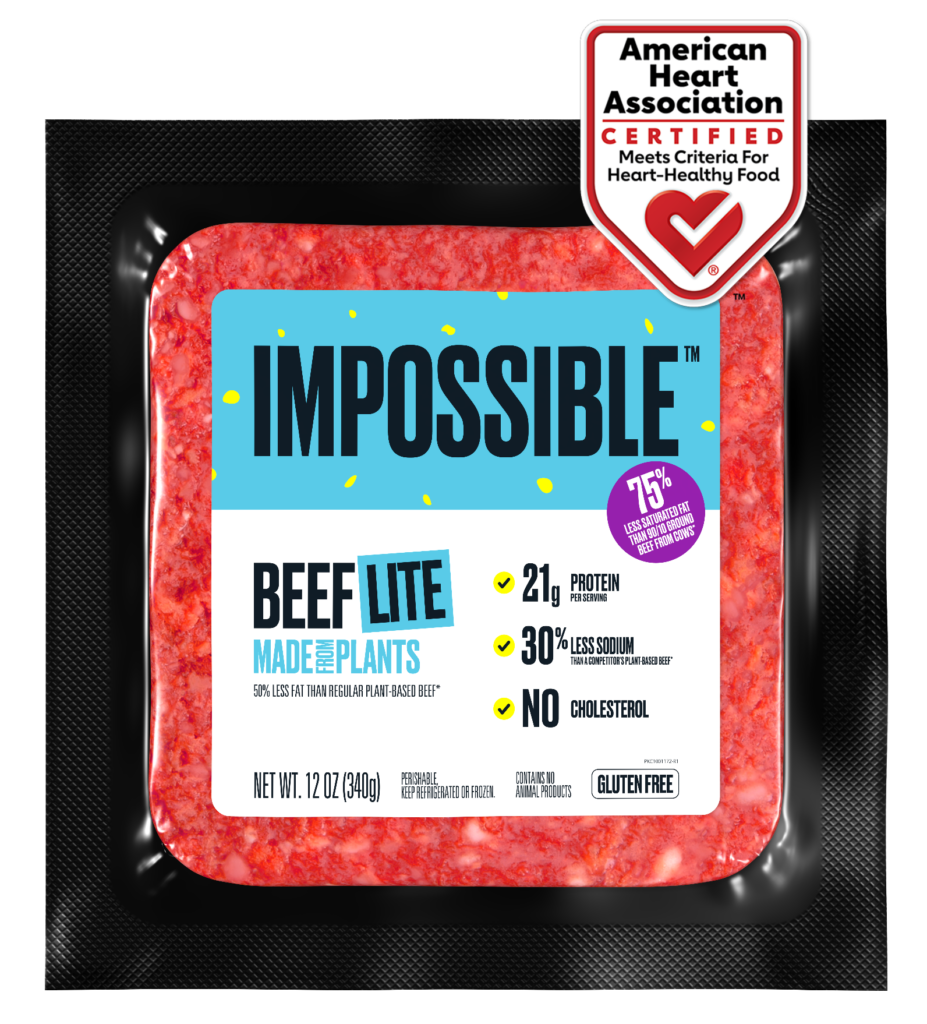Following more grim quarterly figures from Beyond Meat and continued weakness at US retail in plant-based meat alternatives, Impossible Foods CEO Peter McGuinness says his company is outperforming the category at retail and continuing to grow its foodservice business.
Speaking to AgFunderNews after Impossible Beef Lite secured certification from the American Heart Association’s Heart-Check Food Certification Program (more on this below) McGuinness said: “I’ve spoken to all the CEOs in plant-based meat and I think we all agree that our foods can continue to get better. The category is very challenged for all the reasons we’ve talked about.
“The category is down in retail, but we are the best performing plant-based company in the United States. We’re the only one growing share year every year and significantly outperforming the category. So I’m actually quite happy with that, and a lot of new innovation isn’t even out yet, or our new packaging. So I feel good about where we are, although I do not feel good about where the category is.”
Burger King: ‘We feel good about our sales’
Asked about comments made by the CEO of Restaurant Brands International, the parent company of Burger King, in an article in Bloomberg entitled ‘Burger King won’t offer more US plant-based options in near term,’ McGuinness said:
“We like our performance at Burger King; we’re a four-year partner and we feel really good. We have a great relationship with Burger King. What the CEO of RBI was saying is that they’re focusing on their core business. And that gets translated to clickbait headlines about de-prioritizing plant-based. But that’s not what he said, and that’s not what they believe.
“We feel good about the relationship. We feel good about our sales, the Impossible Whopper is important to us and it’s important to them, and we are working with them exploring other innovations.”
He added: “We’re in more than 45,000 foodservice locations and that business is growing. We’re in big chains such as Applebee’s, IHOP, Ruby Tuesday’s and Starbucks but also a lot of independent restaurants, which is a big part of why we launched the Indulgent Burger. Restaurants were saying, the quarter pounder was getting lost in the build. Can you make me something bigger, juicier, a little bit more premium?”
Marketing plant-based meat: ‘We’ve got to counter this chemical, fake, overprocessed [narrative]’
Asked about Beyond Meat CEO Ethan’s Brown’s contention that “the [negative] health perception of the category is the most immediate and important variable to address in order to restore growth,” he said:
“We’ve got to counter this chemical, fake, overprocessed [narrative]. There have been a lot of things said about plant-based and some of it sticks. The processed [narrative] has stuck with consumers and we’ve got to fix it and attack it head on.”
Quizzed on what this might look like in practice, he said: “It’s incumbent upon each individual plant-based company to correct the narrative for themselves and the category, but I also believe there’s a play to do a collective effort. There are some challenges [funding a collective marketing campaign, for example], particularly for smaller companies. But it’s also about prioritizing resources.”
He added: “I’m not saying this [perception that plant-based meat is too processed] is the biggest thing holding us back, the biggest issue is the lack of penetration, awareness and trial, but as we know in politics, when people keep saying something over and over and over again, people start to believe it.
“So I think there is a subset of people that have been exposed to this [hyper-processed] message [about plant-based meat] and as a result they’re a bit more resistant or hesitant.”

Beef Lite heart health check
Securing an American Heart Association certification on the Impossible Beef Lite product (something that Beyond Meat has also secured for its Beyond Steak product) is one tool to help counter negative perceptions about the health credentials of plant-based meat, claimed McGuinness.
“Impossible Beef Lite [made from plants] has 75% less saturated fat than lean 90:10 beef [from animals], 21g of protein, no cholesterol and all the micronutrients you’d expect including iron, B vitamins, zinc and potassium.”
He added: “What we’re seeing in the data and just from people we talk to at stores every week is that they want these products to taste good and be good for them. As you go further down the funnel, you can talk about animal welfare, climate change and planet health. But people are inherently selfish. They’re going to care about their own health before they care about the planet’s health.
“Getting the American Heart Association heart check is a significant milestone for us and it’s something we’re going to leverage from a nutrition perspective.”
Meat alternatives by numbers
US retail sales of meat alternatives have declined precipitously over the past couple of years, falling 12.2% year-over-year (YoY) to $76.7 million in September 2023 in conventional multi-outlet channels (grocery, mass/supercenter and club), with volumes down 16.5%, according to Circana data crunched by 210 Analytics.
For the year to October 1, dollar sales fell 9.8% to $1.1 billion, while volumes were down 16.5% year over year.
To place this in context, total fresh and processed meat department dollar sales were down 1.4% YoY to $6.5 billion in September with volumes down 1.8%.
For the year to Oct 1, dollar sales were up 0.1% while volumes were down 1.5%. Frozen processed meat sales were down 3.5% YoY in September to $424 million, while unit sales were up 5.6%.
McGuinness did not provide any up to date figures on Impossible Foods’ performance at US retail.
Further reading:





